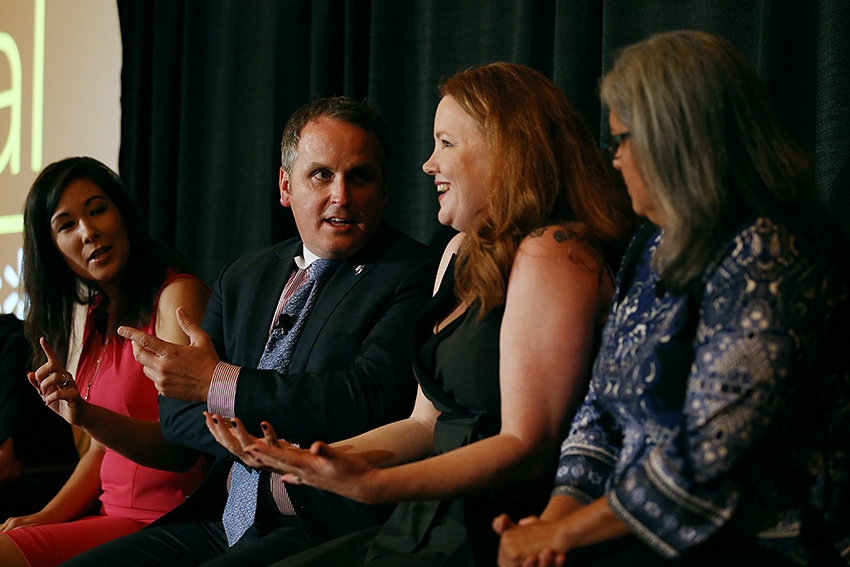On Saturday afternoon, a Texas Tribune Festival panel ignited a heated conversation about the politics of abortion and the state of women’s reproductive health clinics in Texas.
Panelists Heather Busby, executive director of NARAL Pro-Choice, and state representative Jessica Farrar argued the importance of funding abortion clinics for the protection of women’s reproductive health.
Panelists Emily Cook, political director of Texas Right to Life, and Bryan Hughes, Republican candidate for Texas Senate District 1, took the opposite stance. They argued against funding abortion clinics, stating that all lives need to be taken in consideration, including the life of the unborn child.
Moderator Morgan Smith began the panel by explaining that in 2013, the U.S. Supreme Court struck down Texas House Bill 2, or HB2, saying that the bill’s restrictions placed an undue burden for a woman’s constitutional right to an abortion.
Initially passed into Texas law, HB2 included restrictions that required Texas facilities performing abortions to meet hospital-like standards, which, according to Busby, are often unnecessary and extremely difficult to meet. These standards include doorways large enough for hospital beds to pass through and minimum sizes for rooms.
Although HB2 was eventually overturned, abortion clinics still suffered — only 19 of the 40 clinics in Texas are open today.
“This bill was built on a sham,” Busby said. “It took access away from healthcare, but the reality is we have such a fight in this state. We are looking at an uphill battle to increase healthcare access to everyone overall.”
According to Farrar, another problem for women’s healthcare access in Texas stems from government funding cuts to Medicaid, a federal and state joint-funded health insurance program for low-income populations. Cutting Medicaid insurance leads to not only punishing Planned Parenthood, but also decreasing much-needed access to healthcare, Farrar said.
However, Hughes argued that the Medicaid program has numerous problems, and funds can be diverted to comprehensive women’s programs.
“Medicaid is a program no one wants to be in,” Hughes said. “It’s a broken system.”
Busby stated that by cutting funding to healthcare programs like Medicaid, Texas is not doing the best for its residents, as seen by the fact that Texas has the highest maternal mortality rate in the country and most of the industrialized world.
More women die while pregnant or within 42 days of pregnancy in childbirth in Texas than any other state, and this is an indication that the state is failing some of its most vulnerable people, Busby said.
“The truth is, the maternal mortality rate is high, and it disproportionately affects African-American women, and, that to me, signals the problem of institutional racism that is constantly perpetuated by our system,” Busby said.
In contrast, Cook argued that while the mortality rate is high, this statistic includes multiple conditions, such as hypertension, that do not directly relate to reproduction. According to Cook, Texas is funding an all-comprehensive women’s health program at an unprecedented level since 2011.
“People are providing healthcare services to take care of women and children all across the spectrum, and that’s where our taxpayer money should be going — not to abortion clinics,” Cook said.
Farrar also addressed the repercussions of forcing people to become parents.
“I mean, look at the tradition of Child Protective Services,” Farrar said. “When we force people to become parents who are not willing, who are not able, who cannot be the parents that every child deserves to have, then [the children] fall into the system.”
Cook and Hughes also stressed the moral implications of taking away an innocent human life.
“These are unborn children and we are deciding who is more valuable than anyone else’s life,” Cook said. “Who are we to determine that someone else’s life is [less] worth living than ours? We simply do not get to make that decision as a society.”
However, both sides agreed that every life in each health case is important, and it is crucial to have open discussions about these issues.
“The best way to prevent an abortion is through family planning and education,” Farrar said. “It’s not just on the shoulders of the woman. Because we do that too often; we blame the woman and charge the woman with this responsibility, but it’s also the man’s responsibility.”















